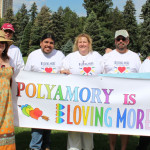By Mystic Life
I was recently asked, via my blog, to respond to the question I've listed below from a woman who was (like most of us) raised to be monogamous.
Upon reflection, I felt that my response may be helpful to readers who are still in the process of defining their values, or who perhaps have friends or family who try to challenge their choice to be polyamorous by stating it requires them to be “unfaithful” to their partner.
“Why is it so hard to be faithful when I know I love my partner?”
 I think the answer to this question is contained within the definition of the word "faithful." The concept of marriage (one form of partnership) stems from a history of dowries, deals and ownership. As time has progressed, humans have tried to make it more beautiful, but one aspect that hasn't been questioned in mainstream culture is the concept of monogamy.
I think the answer to this question is contained within the definition of the word "faithful." The concept of marriage (one form of partnership) stems from a history of dowries, deals and ownership. As time has progressed, humans have tried to make it more beautiful, but one aspect that hasn't been questioned in mainstream culture is the concept of monogamy.
Even in many spiritual practices which recognize that attachment is the root of suffering, monogamy is the exception. In other words, you can work on all aspects of releasing attachments while still accepting it is normal and healthy to have attachment to what your partner does with his/her love, and especially with his/her sexuality.
Jealousy stems from sociobiological drives and psychological insecurities, but we are reaching a critical time in the evolution of our species in which absolutely no form of ownership or attachment is going to be perpetuated without suffering. This doesn't mean that nobody should be monogamous. There are some people who truly want to be with one partner. Unfortunately (for the egos of many people), many partners would not say "No thanks!" if asked, "My attractive friend is lonely and desires you. I don't feel jealous and wondered if you would feel comfortable making love with him/her?" The uncomfortable truth is that many people are monogamous not because they want to be, but because they feel they "have to be" in exchange for love.
 The lack of options results in infidelity in over half of all marriages. In addition to compulsive sex leading to an increased likelihood of spreading STDs, cheating also requires deception...which is not compatible with a spiritual life. Before my spiritual awakening, I cheated in several relationships and truly believed, "What they don't know won't hurt them." When I began to understand how we're interconnected, I came to know why I could no longer lie to anyone I cared about...let alone cheat.
The lack of options results in infidelity in over half of all marriages. In addition to compulsive sex leading to an increased likelihood of spreading STDs, cheating also requires deception...which is not compatible with a spiritual life. Before my spiritual awakening, I cheated in several relationships and truly believed, "What they don't know won't hurt them." When I began to understand how we're interconnected, I came to know why I could no longer lie to anyone I cared about...let alone cheat.
The pattern that most people fall into is dating a new person on the average of every 1 or 2 years, then reaching a certain age at which they believe it's time to get married. Sexual diversity is supposed to end at this point, and one person is supposed to meet your emotional and sexual needs until one or the other in the partnership dies. This works for some, but not for all. I believe that those who feel tempted to "cheat" may be better off being polyamorous. Some are here for an intense long term romantic lesson with one person. Some are here for romantic lessons with a variety of people throughout their life. Some are here to be celibate. We're clearly not all here for the same purpose, so trying to squeeze our experience of love into one socialized box simply doesn't work. This can leave people feeling confused about why they can't make love work. They question their partner choices, but rarely question the system of monogamy itself.
Personally, I move through lessons very quickly...so being with only one person for the next 50 years feels as though it would require suppressing myself. This may change at some point in the future, but it is currently my truth. So I've decided to let go of the concept of marriage, release the idea that I will know what my life will look like in the future, and let go of my impulses to limit myself or my lovers. It takes ongoing practice to live like this, but I feel the benefits of freedom, allowing and diversity outweigh what I would call an "illusory" form of relationship security.
 So, back to the definition of "faithful." People often use faithful as a metaphor for monogamy. But when digging a little more deeply into that word, it's clearly rooted in whatever you consider to be spiritual behavior. If you are socialized to be a good Catholic, for example, then being faithful means following the rules of your church, your Pope, and the bible (as interpreted by your religious leaders). The archaic messages from these sources are likely to create inner turmoil since they are not aligned with who you are. They are aligned with ancient, oppressive rules.
So, back to the definition of "faithful." People often use faithful as a metaphor for monogamy. But when digging a little more deeply into that word, it's clearly rooted in whatever you consider to be spiritual behavior. If you are socialized to be a good Catholic, for example, then being faithful means following the rules of your church, your Pope, and the bible (as interpreted by your religious leaders). The archaic messages from these sources are likely to create inner turmoil since they are not aligned with who you are. They are aligned with ancient, oppressive rules.
There are many people who are realizing that they don't need a church or book of rules to be spiritual. They find guidance within, through synchronicities, and from non-dogmatic spiritual concepts. In this realm, faithfulness means following your spiritual guidance. If you feel guided to be intimate with someone other than your partner, be honest with yourself, and honest with your partner. Sometimes when attractions are discussed openly they may dissipate...and you will find that you feel content with them not manifesting in physical form. Suppression can build up energy until you make a choice in a moment of passion to have a compulsive affair, which leads to conscious or unconscious guilt. It is more wise to deal with attractions thoughtfully and openly. If your partner despises you for your honesty, it is probably not a relationship that is founded in love so much as ownership.
Be faithful to yourself first and foremost. We are not here to please other people. This would only be possible through self-suppression. Many people are only loved for their "performance" instead of who they really are. When you're honest with yourself and others, you at least have the potential to be loved for who you are. If being faithful to yourself results in the end of your partnership, that is not necessarily a bad thing. It may hurt for awhile...but ultimately you must follow your heart, even if it means letting go of previous agreements which no longer serve your personal evolution.








Mystic Life, what a fabulous article. With your permission, I would love to use this with the women’s workshops that I run. Acknowledging its source of course.
So many people have not yet cottoned on to the oppression and suppression of women and sexuality orchestrated by the church and other religous bodies for centuries and more recently by the medical and pharmaceutical industries.
While the writer might have some points to consider…in my experience, when you truly love someone, you really don’t want anyone else, and you would want to give your all to the relationship. This article smacks of ignorance, wrapped up in the guise of spirituality and psychology….
“Why is it so hard to be faithful when I know I love my partner?” stated at the beginning
…it’s not hard if you have a good set of values, some ethics and know how to love completely.
This I know for sure!
Thank you for your feedback, Barry. Feel free to use the article in your workshops 🙂
krys, I’m glad you found this article helpful. Thanks for your feedback.
Lindsi, I’m glad it resonated for you. 🙂
Um.. when you wrote “lessons”, did you mean liasons? Or do you consider each relationship to be a lesson on the path of life?